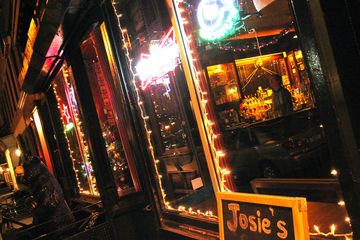Masami Hosono’s mother worked in fashion. Growing up in Tokyo, she always knew that she wanted to work in fashion herself, but something was missing: socializing. “I love to talk and meet people, ” she explained to me with an amicable smile. In a white, modern space with a rack of clothing on her left, Masami shared her story. When she turned eighteen, Masami met a “very great hairstylist, ” with whom she would work and learn for the next four years. Her passion for hair, style, music, and socializing ultimately led her to quit her job in Tokyo and board her very first plane to New York in 2012. “I was like, I don’t speak English, but I can cut hair, ” she recounted. “Maybe I can do it. ”The New York Masami had heard about back home could not compare to the one she arrived in. She told me, “Japanese people love New York City, but they only know cool fashion, cool hair, cool music. But there’s more good stuff, personality, freedom. ” One of the biggest surprises, but also most appealing aspects of the city, was its dynamic queer scene. “Being gay in Japan is very hard, ” Masami recalled. “I’m from Tokyo, and it’s a very conservative place. But in New York City, everything is mixed. The queer culture is amazing. ”Life in New York was, understandably, a big adjustment. With no place to live, Masami spent her first nights in a hotel, and her first days exploring the streets. But she took the challenges of a new country in stride by doing what she does best: cutting hair and meeting people. While Masami made a living by cutting hair in Williamsburg, she also offered free haircuts to make friends. “I just found people on the street, ” she said with a nostalgic laugh. “Like, ‘oh, they look cool. ' And I asked them, ‘Can I cut your hair? ’” Little by little, through about 400 free cuts a year, Masami began to learn English, and build a community of friends. “Musician clients would say, ‘I’m playing tonight, you should come. ’ So I go, and they introduce me to more musician friends. I met one designer because I cut his girlfriend’s hair, and he makes music videos, so he asked if I could do the hair for the music video. I’ve met so many very cool people who are musicians, artists, skateboarders... all these artists who can hang and make creative stuff together. ”In 2015, Masami moved from Williamsburg to the East Village to work at Assort International Hair Salon. There, she took the final leap: She told her boss she wanted to open her own store. In April of 2016, Masami and her boss went into business together as Creative Director and Founder, respectively, of Vacancy. Masami stressed the importance of collaboration in small business work: “I’m really happy to have the founder because I really can focus only on the creative side. It’s really important to have the creator and financial person separate. ”Vacancy is more than a just a hair salon; it is also a pop-up retail shop (with items designed by friends of Masami) and artist hang-out. While Masami’s hair clients come from far and wide (“Do you know the singer Rachel Trachtenburg? Yeah, I chopped off her hair”), Vacancy still maintains the vibe of a small, local business, while serving a massive and ever-expanding web of Masami’s friends. Masami’s haircut services have a very specific appeal. “My haircut style is not super fancy, ” she told me, “because when I came here, I met a lot of people on the street. They always have amazing hair, and I ask ‘Where did you get a haircut? ' and they say ‘Oh, I cut it myself. ’ So I do kind of DIY, very grungy, choppy, messy. ” Her cuts are still customizable: Vacancy offers hair designs in “a lot of crazy colors, ” from pink to blue and everything in between. Masami and her army of artistic friends will not be confined to the shop. In addition to haircuts, Masami collaborates with her friends to produce a number of visual and literary creative projects, to bring their art and vision to the general public. She edits and produces a blog (or “web journal”), which features interviews and photographs of all sorts of artists, from painters to sculptors to Instagrammers, whom she has met through cutting hair. She also produces a monthly radio show, Vacancy Radio, through which she introduces listeners to her musical friends (“People are at work like ‘What am I gonna listen to today? Vacancy Radio! ’”). Most recently, Masami has produced a zine (a self-published, miniature magazine) featuring her own hair and makeup designs and pictures by her friends in photography. She is currently working on a second zine. To bring everyone together, Masami often hosts “book and zine events” in the Vacancy space, where her friends can gather and share their work. “People can come and hang out and, well, drink, ” she added with a laugh. With so many friends and projects in her repertoire, one might think she would be ready to call it a day, but this is only the beginning of Masami’s vision for Vacancy. While she will always be cutting hair, Masami dreams of an entire Vacancy building just for artists. “I want a full coffee shop, and maybe a bar. I want shared studios where the artists can make art. We can have an exhibition. We can have a music studio downstairs and live shows. Like an art house. ”As she moves into the future, Masami Hosono makes sure never to lose sight of her roots. As she guided me on her journey from newcomer to centerpiece of New York’s artistic community, what became increasingly clear to me was her awareness of the potential that her prominence in a new country gave her to make change back home. No matter how well-known Masami’s work becomes, her queer identity has always been, and will continue to be, the center of her narrative. Masami has made the decision to return to Japan this summer, and potentially begin a regular practice of working in both countries. She has already booked an interview with a Japanese magazine and looks forward to bringing New York’s culture of openness back to her homeland in whatever ways she can. “When I have a magazine interview or work in Tokyo, I want to talk about it more, little by little, ” she said. “I will change the culture if I can. ”



